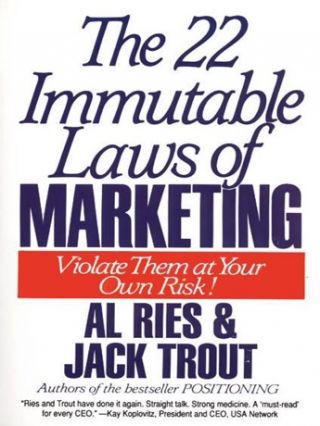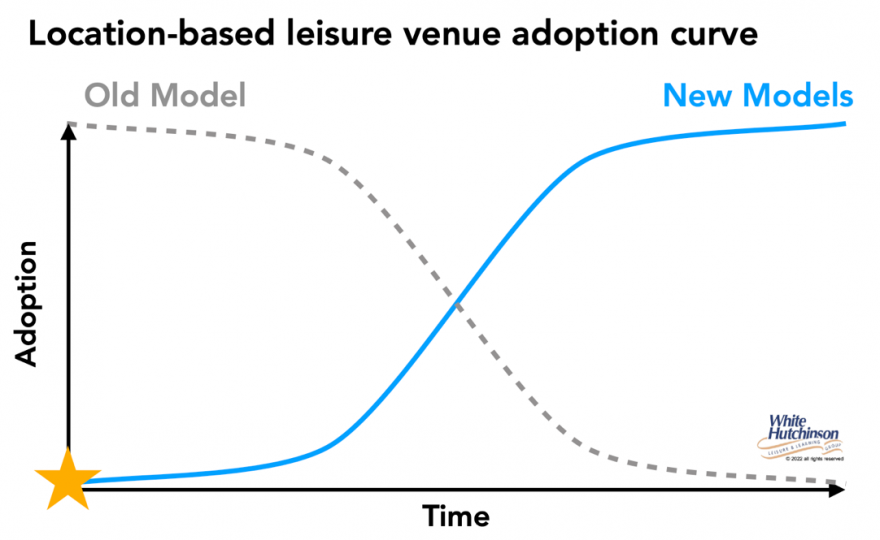
Vol. XXIV, No. 5, September 2024
- Editor's corner
- Premiumization, the next phase in leisure spending
- Attendance patterns for location-based entertainment venues
- How the immutable laws of marketing are changing the location-based entertainment industry
- Is a backlash against digital culture underway?
- Flavor-forward foods
- Topgolf's sales decline
- Important factors for deciding what experiences to spend money on
- Homebound: The long-term rise in Americans' time at home
- Sports activities now exceed pre-pandemic levels
How the immutable laws of marketing are changing the location-based entertainment industry

Three decades ago, back in 1994, marketing gurus Al Ries and Jack Trout published what has become a classic book on marketing, The 22 Immutable Laws of Marketing, Violate Them at Your Own Risk! Their use of the term marketingrefers to marketing in its broadest sense, product or service development - designing the consumer offering so it will be successful. Too many people mistakenly think marketing is about advertising. If you don't develop the right offering that appeals to the consumer, no amount of advertising or discounting will solve the problem.
Their book discusses basic universal principles or laws of marketing that have been proven over decades for all categories of consumer products and services and are immutable, incapable of, or unsusceptible to change. The book's 22 laws for marketing apply just as much today as they did back in 1994 on how to succeed in the marketplace, including for location-based entertainment.
"Marketing is a game of mental warfare. It's a battle of perceptions, not products or services…There is no objective reality. There are no facts. There are no best products. All that exists in the world of marketing are perceptions in the minds of the customer or prospect. The perception is the reality. Everything else is an illusion." - the authors
The authors point out that you can build an impressive airplane, but it will never leave the ground if you ignore the laws of physics, especially gravity. Why, they ask, shouldn't there also be laws of marketing that must be followed to launch and maintain winning businesses?
What we see too often in the community location-based entertainment industry (LBE) of all types, which includes family entertainment centers (FEC), is that for some reason, developers and owners don't understand that these immutable marketing laws also apply to their venues. They try to follow what they think works, when what works is counterintuitive to their thinking and has been repeatedly proven wrong in the world of marketing. For some reason, the developers and owners think LBEs and FECs are a unique category with their own unique set of marketing laws. How wrong they are.
Here are a number of the Immutable Laws that we find are reshaping the location-based entertainment industry.
- The Law of Division - Over time, a category will divide into two or more categories. As a result of this law, the marketing arena will always be an ever-expanding sea of categories.
- A category will start as one category. Computers, for example, started as mainframes. But over time, the category brook into other segments - workstations, laptops, tablets, etc. Beer started the same way. Now we have imported and domestic beer, premium and popular-priced beer, light, draft, pilsner, ale, lager, non-alcoholic, etc.
- Law of the Category - If you can't be first in a category, set up a new category you can be first in. It's hard to gain leadership in a category where competition already exists. Everyone is interested in what's new. Few people are interested in what's better.
- Law of Sacrifice - You must give up something to get something . A generalist is weak. A specialist can have a strong brand. This includes sacrificing part of the market to gain a greater portion of a smaller niche market.
Back in the 1980s and early 1990s, when indoor family entertainment centers (FECs) first emerged, the first centers opened with the idea they would win by being first for everyone. They tried to cater to all age groups with things for children, teenagers, and adults. Yes, they were first, but the industry quickly evolved, and more specialized concepts focusing on narrow market niches evolved, such as children's entertainment centers (soft play centers), adult-oriented facilities (Dave & Buster's), etc. (Law of division). These concepts gave up part of the market to do a better job with a market niche (Law of Sacrifice). Centers that did a better job with just one attraction, such as laser tag, took ownership of those attraction categories. The original FECs "with a little bit of something for everyone" lost market share. Categories continued to evolve with different types of children's centers, such as pure entertainment, edutainment, play cafes for preschoolers, or offering various attractions such as inflatable and trampolines. Today, adult-oriented concepts continue to evolve, especially the new social gaming (competitive socializing) adult-oriented concepts with mini-golf, darts, bowling, axe throwing, shuffleboard, or other social games owing their categories (Law of Category).
We continue to see new centers being developed that replicate the concepts of the industry's past by trying to appeal to everyone with a little bit of everything and other older concepts that are now out-of-date based on the consumer's and industry's continuing evolution.
For many older LBEs and FECs, it's time to rethink their business models as the out-of-home leisure and entertainment industry has evolved. New models are taking market share away from old models, as the LBE adoption curve illustrates.

Today, we believe that the consumer has evolved. With them, the industry has evolved into so many niche concepts (The Law of Division) that the traditional FEC model is becoming increasingly obsolete. Today, there are only two long-term viable categories except for a small number of a few unique, focused concepts in major metro markets:
- Kid-focused venues - Playing games or participating in attractions that are designed for them, which can be done with their friends, classmates, or other kids.
- Adult-Focused Venues - Socializing, eating, and drinking while playing games or participating in attractions that facilitate socializing with friends, family, and coworkers. Although adult-focused, they still work for families, especially during the day.
In addition to increased competition due to the Law of Division, the classic family entertainment center has also lost appeal since family time has taken on a new meaning. Family time today is entirely different than for Gen X parents. Gen X parents often let their children rule, especially when it came to the choices for family leisure time together. On the other hand, today's parents don't want to relinquish control or give up their own personal pursuits in favor of their children. There's now a new family dynamic of "we're in this thing together."
Most of today's parents say that it's no longer about kid-specific activities when they think about things to do with their children. They want new, interesting experiences that fulfill them personally while bringing their kids along for the ride. 40% of dads even say they have no problem bringing their kids to bars. That is why Dave & Buster's, a 100% adult-oriented venue - they don't have Whac-A-Mole or other children's games - reports that they attract one-third of their attendance from families coming with children.

Kids getting old younger
Another phenomenon also fuels a shift of "family time" away from children's venues to places that satisfy parents' entertainment preferences- KGOY, kids getting old younger. Children's age compression, children becoming more sophisticated for their age in what appeals to them, has shrunk the age range that children's entertainment centers appeal to. In the early days of Chuck E. Cheese's, it appealed to children up to around age 12. Today, it would be rare to find a 9-year-old wanting to go there.
Yes, the Immutable Laws of Division, Category, and Sacrifice are making the classic family entertainment center formula increasingly less relevant to away-from-home entertainment customers.
Subscribe to monthly Leisure eNewsletter
Vol. XXIV, No. 5, September 2024
- Editor's corner
- Premiumization, the next phase in leisure spending
- Attendance patterns for location-based entertainment venues
- How the immutable laws of marketing are changing the location-based entertainment industry
- Is a backlash against digital culture underway?
- Flavor-forward foods
- Topgolf's sales decline
- Important factors for deciding what experiences to spend money on
- Homebound: The long-term rise in Americans' time at home
- Sports activities now exceed pre-pandemic levels


